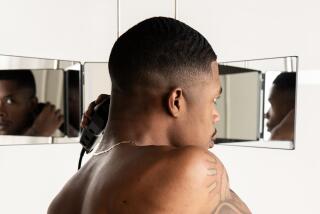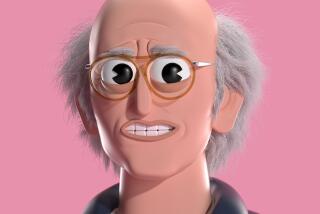Real Barbershops Are Less Cutting
- Share via
The controversy over a character’s dismissive remarks about civil rights leaders helped push the critically acclaimed movie “Barbershop” to No. 1 in the national rankings. Is the movie close to real life in a modern barbershop? MARY REESE BOYKIN spoke with two veteran L.A. barbers about day-to-day life in the black barbershop.
*
Charles England
Barber, New Millennium,
Crenshaw District
A barber is an artist, creating styles in hair like a fashion designer does in clothing. The barber must take into consideration the shape of the client’s head, his physique, his facial structure.
I started cutting hair when I was in high school. When I joined the Marine Corps in 1982, there were lots of inspections. Some of the guys felt that I did a better job than the barbers.
Every man likes to look neat. The neatness starts with a good-looking haircut and a well-kept mustache.
In our shop, every barber has a technique. If a client likes another barber’s style, that barber does his hair, and there are no hard feelings.
I feel that the barber can be a father figure or a role model, both in his looks and in his character. With my young customers--and most of my clients are teens--I build their self-esteem. I tell them not to texturize their hair. I want them to love themselves as they are.
Being a barber gives me an opportunity to instill knowledge, inspire and encourage young men to stay focused.
I get to meet such a wide range of people. I prefer this job to an office job, and a barber is never forgotten. The barber creates good friendships with lots of trust, especially given the fact that there is razor shaving. In the shop, we discuss politics, religion, sex, race, sports, body building, music. To our clients, we become a teacher, a psychiatrist, a dermatologist. We have to have street sense, too.
We barbers have other interests also. During our downtime in this shop, you may find one barber reading a book, another writing a short story and yet another writing his movie script.
*
Dyane Ibrahim
Barber/Owner
Chiefs Economy Barber Shop
For 50 years, my dad owned a chain of barbershops, though the shop was never my hangout. The shops were family-oriented, places where there was no cursing, drinking or gambling--when he opened his first shop in 1946, some barbershops were bookie joints. I have felt true to his values. Parents can drop off their children and not worry about them.
Previously, I worked in corporate America, but as my company downsized, my father encouraged me to learn the profession and take over the Leimert Park shop, the only one of his shops that he kept after his illness. By then a single mother, I found many advantages in being a barber, especially the flexibility to participate in my children’s school activities.
As a female barber, I made the decision to be reserved, not to participate in certain conversations.
In this public forum of men’s voices, I give them their privacy. One day, a client talked openly about his prostate cancer. I remained quiet. But because my father died of prostate cancer, when the barber was done with the customer’s hair, I spoke to the client outside. I stressed that he cannot dismiss his illness, that with an early diagnosis like his, the cancer is so treatable.
When the conversation turns to politics or to a subject for which women’s agendas need defending, I speak up. There are other times when a male customer may say, “I’m thinking about getting back with my wife. Give me a woman’s perspective.”
I enjoy being a barber. Every day is like a party with new guests.
More to Read
Only good movies
Get the Indie Focus newsletter, Mark Olsen's weekly guide to the world of cinema.
You may occasionally receive promotional content from the Los Angeles Times.










